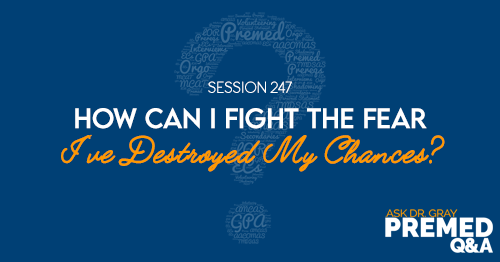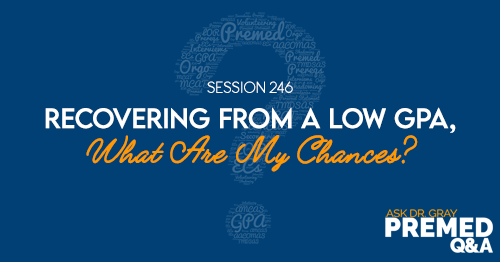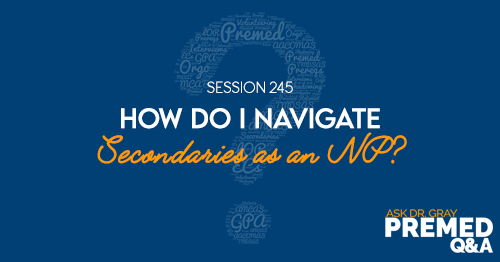Apple Podcasts | Google Podcasts
Session 223
This student is eager to start medical school – the soonest! Will his young age hinder his chances of getting into medical school?
Ask Dr. Gray: Premed Q&A is brought to you by Blueprint MCAT. Listen to this podcast episode with the player above, or keep reading for the highlights and takeaway points.
The episodes in this podcast are recordings of our Facebook Live that we do at 3 pm Eastern on most weekdays. Check out our Facebook page and like the page to be notified. Also, listen to our other podcasts on MedEd Media. If you have any questions, call me at 617-410-6747.
[00:32] Question of the Day
“I’m a current ninth-grade student at Michigan Early College High School, which is a dual enrollment program that lets you take college courses starting from high school. And they have all of the free medical coursework at the community college. I was wondering if I take all of the premedical coursework at the community college now through ninth 10th, 11th, and 12th grade, will that hurt or negatively impact my chances of getting into medical school?”
A: Potentially, there are some medical schools that don’t like community college. They think community colleges are “lesser” than four-year university classes. But if you do well in them, and when you go to your four-year university, and you take upper-division science courses, and you continue to do well in them, ultimately, it shouldn’t be a big problem.
[01:36] The Challenge Among International Medical Graduates
This student mentioned that in their experience in a counseling class called Provision Lifestyles, they had to research colleges and universities to transfer their credits. During their search, they discovered that there are medical schools in the Caribbean that offer integrated combined BS/MD programs or premed MD programs, which can be completed in a shorter time frame compared to the US. They reached out to several schools and learned that they could transfer most of their credits if they first completed their coursework at a community college.
He is now seeking recommendations and perspectives on whether pursuing an MD in the Caribbean right after high school would be advisable. His reason is that their programs have a faster pace. It seems, however, that he is in a rush and he explains his main goal is to pursue interventional cardiology, which takes so long so he wants to save time.
“The biggest concern with being an international medical graduate with going to the Caribbean is that it's much harder to match.”Click To TweetNow, for interventional cardiology, you need to match into internal medicine first. Then you match into a cardiology fellowship. As an international medical graduate, you will have less concern about matching into internal medicine. The biggest concern with being an international medical graduate with going to the Caribbean is that it’s much harder to match.
Now, it depends on the school as some schools have better match rates than others. But in general, being an international medical graduate hurts your chances of matching into residency. With that said, there are many phenomenal physicians who come out of Caribbean medical schools, but it shouldn’t be your first choice.
[04:23] Being Young Can Hurt You Too!
Seriously consider going through the very traditional route of doing your community college classes as dual enrollment. Lots of students do that. Go to a four-year university and graduate in probably two years, assuming you’re getting lots of community college classes. Then apply to medical school.
“Being young can hurt you because maturity is a big part of this process”Click To TweetNow, at 20 years old, you’re going to be young so that’s going to hurt you potentially when you’re applying to medical school. Having the necessary clinical experience is a big part of this process.
Obviously, there are always caveats and nuances to that. But that would be the safer route, and it’s the preferred route to give you as many options as possible to match into internal medicine and then cardiology as a future potential career.
Most students change their minds when they get to medical school and they change their minds on what they want to do. So it’s very interesting how this young student is already so sure he wants to be an interventional cardiologist.
[06:08] Finding Research Positions
Q: “They told me that I should try to get research positions somewhere to make me stand out to become more competitive. But I’m having a very hard time finding research positions for biology or something like that. Do you have any tips when it comes to researching for research, research positions in the medical field?”
A: Find the big academic hospital that you live near the closest one, where they have a cardiology department. Look at all of the physicians and then just start Googling, for instance, “Dr. Smith – research” or “Dr. Johnson – research.” Then try to see what they’re doing.
You can reach out to those physicians and tell them you would love to help out but you’re only this age. Then just see what they can do to help you. Since again, your age is going to be the biggest issue for you.
“The hospital may have some age limitations.”Click To TweetLinks:
Medical School HQ Facebook page
Medical School HQ YouTube channel
Instagram @MedicalSchoolHQ
Join the Application Academy!
The Premed Playbook: Guide to the Medical School Personal Statement
The Premed Playbook: Guide to the Medical School Application Process
SEARCH SITE
LISTEN FOR FREE












